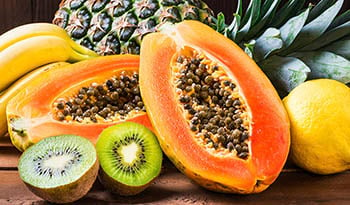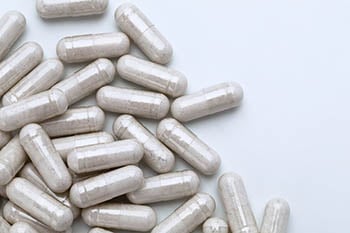Probiotics and Digestive Enzymes: Incredible Gut Health Benefits
DISCLAIMER:This blog does not intend to provide diagnosis...
- In this article:
- Major Causes of Chronic Intestinal Symptoms or Leaky Gut:
- Some Holistic Solutions:
- Why are so many people suffering from Gastrointestinal issues?
- Non-GUT Diseases That May Also Improve With Use of Probiotics:
- A History on Probiotics
- How Probiotics Can Help
- Researched Bacterial Strains Used in Probiotics:
- Beneficial Yeast Strains
- Use of Digestive Enzyme Supplementation as an Alternative to Probiotics
- Commonly Used Digestive Enzymes and Their Uses
- Gut Health Is Not One Size Fits All

Does your gut feel like a warzone? For many, the answer is yes. In the United States, surveys have shown that more than half of American adults suffer from chronic gut and stomach discomfort. Other studies show similar numbers throughout Asia, Russia, and Europe. Many individuals can find a partial or complete resolution of many gut issues by changing one’s diet, consuming probiotics and/or supplementing with digestive enzymes. We will discuss the benefits of each.
More than 2,000 years ago, Hippocrates stated: “All diseases begin in the gut”. Not only is it important to understand the root cause of the gut problem, but also how probiotics and digestive enzymes can help restore balance.
Major Causes of Chronic Intestinal Symptoms or Leaky Gut:
- Overgrowth of harmful gut bacteria
- Food allergies and food sensitivities
- Digestive enzyme insufficiency
Some Holistic Solutions:
- Dietary changes: Avoid food which triggers symptoms (dairy, wheat, corn, and soy are most common)
- Use of strain-specific probiotics to increase gut bacteria diversity
- Digestive enzyme supplementation to help nutrient absorption
Why are so many people suffering from Gastrointestinal issues?
Today’s leading theories propose that most digestive issues are a result of rapid changes to environment, foods, and agriculture. These changes, along with new approaches to food processing have affected the composition of our diet, food quantity intake and the quality of our food, which predisposes us to food allergies and food intolerances. Most doctors would agree that we are definitely seeing more problems than in generations past.
Food manufacturers are using more pesticides, antibiotics, growth hormones and other “innovations” to improve product yield. However, this is not without consequence. It is believed that humans have not evolved at a fast-enough pace to keep up with the more rapid changes to our foods.
Further, overuse of antibiotics in both humans and animals, when not required, and over-reliance on acid reducers are contributing factors which may also harm gut health.
This creates imbalances that lead to inflammation in the gut and can induce or worsen many different gastrointestinal maladies. Some suggest we need to go back to the eating style of our hunter-gatherer ancestors. This is a common argument for those who promote the paleo (paleolithic) diet or primal diet.
Over the last decade, we have learned a lot regarding the importance of a well-functioning digestive system. Even medical conditions such as Acid reflux, Irritable Bowel Syndrome (IBS), Crohn's Disease, Celiac Disease, and Ulcerative Colitis are now believed to be due to changes in nutrition and gut microbiota.
Studies show that supplementing with probiotics not only can positively affect our microbiota but may also benefit conditions not traditionally associated with gut health.
Non-GUT Diseases That May Also Improve With Use of Probiotics:
- Anxiety and Depression
- Allergies and Autoimmune diseases
- Heart disease
- Hypertension
- High Cholesterol
- Insulin resistance, prediabetes & diabetes
- Kidney disease
- Obesity and overweight
A History on Probiotics
The use of fermented foods and their potential benefits has been a long pondered in the scientific community. Mankind has been consuming fermented products since 10,000 BCE, and they were often consumed for health benefits.
Some of the earliest research on probiotics was conducted by Elie Metchnikoff in 1905, where she found that the Bulgarian population she studied had increased longevity due to its use of fermented milk products. The first historical account of a probiotic being isolated was in 1917, where Alfred Nissle isolated a strain of E. coli which had some protective benefits. We have also realized that prebiotics, which are the foods our gut bacteria consume, are also very important to our health.
As a response to their growing popularity, probiotics supplements and interest in the gut microbiota have become extensively studied by the scientific community. With this influx in research, there is now overwhelming evidence showing that the use of probiotic supplements can not only positively affect the health of the gut, but the health of the whole body.
How Probiotics Can Help
The underlying medical problems that probiotic supplementation is intended to treat is known as “dysbiosis.” Dysbiosis is basically a state in which our gut loses the important diversity of the thousands of bacterial strains that colonize our gut and keep us healthy.
In addition, our fast-food diet and aging are also affecting our gut. We also know that babies who are born via cesarean section and who may not have been breastfed have a different gut than those born vaginally and who are breastfed.
Once a unique bacterial species in our gut is lost, it is oftentimes lost permanently or at best, may take months or years to recover. No matter how much one changes their lifestyle, they may not fully recover the diversity of their gut bacteria without the use of probiotic supplements.
Once the harmful triggers are removed, probiotics can help improve the health of the gut by repopulating the good gut bacteria and restoring balance to the intestinal gut community.
While probiotics can be sold as individual strains, many available formulas contain a combination of various strains such as those listed below. The recommended dose frequently ranges from 5 billion units up to 100 billion units. Many start low and increase to higher doses as time progresses. This may be simpler for the digestive system.
Researched Bacterial Strains Used in Probiotics:
Beneficial Yeast Strains
Use of Digestive Enzyme Supplementation as an Alternative to Probiotics
As mentioned above, another way to combat food intolerances is to use digestive enzyme supplements. The main philosophy behind the use of digestive enzyme supplements that they break down food ingredients that may not be well tolerated, into more easily digestible substances. The goal is to help one avoid the common side effects of gas, bloating or diarrhea. While avoiding the food trigger is ideal, sometimes, this is not always possible.
While probiotics have a more generalized benefit, such as restoring gut bacteria; Treating gut issues with digestive enzymes has a very narrow breadth of therapeutic focus. The goal of digestive enzyme supplementation is the breakdown of poorly tolerated or poorly digested foods.
Currently, the use of digestive enzymes is not as medically endorsed as probiotic supplementation, but multiple studies have shown it to help alleviate gastrointestinal diseases such as IBS and bloating due to poorly tolerated foods.
As it stands, I would encourage digestive enzyme supplementation to anyone who is still having difficulties with chronic abdominal discomfort, especially after trials of various probiotics. It is also common that one takes both a probiotic supplement and digestive enzyme.
Commonly Used Digestive Enzymes and Their Uses
- Dairy Enzymes (lactase) – help one who is sensitive to dairy. Breaks down lactose molecules to prevent symptoms of lactose intolerance
- Proteolytic Enzymes (bromelain, papain) – help break down protein
- Gluten Enzymes – help breakdown gluten
- Lipase: breaks down fats, may reduce fatty stools
- Alpha-Galactosidase: “Beano”, breaks down fermentable sugars and reduces bloating
Gut Health Is Not One Size Fits All
Seeking answers to the question “why do I have so much trouble with gut health?” can be difficult to answer. The origin for many is likely multifactorial and there is no “one size fits all” approach. The gut is a fantastically complex organ system – when considering the microbiome, there is no other part of the body that can approach this level of complexity, perhaps with the exception of the brain.
The human body has approximately 25, 000 different genes that dictate its entire makeup. Yet, we currently know of over 3.3 million unique genes that exist within our gut microbiome, which serves a testament to why there is much about the gut that is not fully understood. As time goes on, I am certain we will continue to learn more about
References:
- Milligan, Phylllis. “New Survey Reveals More than Half of Americans Are Living with Gastrointestinal Symptoms and Not Seeking Care from a Doctor.” New Survey Reveals More than Half of Americans Are Living with Gastrointestinal Symptoms and Not Seeking Care from a Doctor | AbbVie News Center, 2013, news.abbvie.com/news/new-survey-reveals-more-than-half-americans-are-living-with-gastrointestinal-symptoms-and-not-seeking-care-from-doctor.htm.
- Mössner, Joachim, and Volker Keim. “Pancreatic Enzyme Therapy.” Deutsches Aerzteblatt Online, 2011, doi:10.3238/arztebl.2011.0578.
- Smits, Samuel A., et al. “Seasonal Cycling in the Gut Microbiome of the Hadza Hunter-Gatherers of Tanzania.” Science, vol. 357, no. 6353, 2017, pp. 802–806., doi:10.1126/science.aan4834.
- Barbut, F. “Managing Antibiotic Associated Diarrhoea.” Bmj, vol. 324, no. 7350, 2002, pp. 1345–1346., doi:10.1136/bmj.324.7350.1345.
- Ianiro, Gianluca, et al. “Digestive Enzyme Supplementation in Gastrointestinal Diseases.” Current Drug Metabolism, vol. 17, no. 2, 2016, pp. 187–193., doi:10.2174/138920021702160114150137.
- Kaur, Nirmal, et al. “Intestinal Dysbiosis in Inflammatory Bowel Disease.” Gut Microbes, vol. 2, no. 4, 2011, pp. 211–216., doi:10.4161/gmic.2.4.17863.
- Nath, Arijit, et al. “Biological Activities of Lactose-Based Prebiotics and Symbiosis with Probiotics on Controlling Osteoporosis, Blood-Lipid and Glucose Levels.” Medicina, vol. 54, no. 6, 2018, p. 98., doi:10.3390/medicina54060098.
- Liu, Yuying, et al. “Probiotics in Autoimmune and Inflammatory Disorders.” Nutrients, vol. 10, no. 10, 2018, p. 1537., doi:10.3390/nu10101537.
- Ciorba, Matthew A. “A Gastroenterologist's Guide to Probiotics.” Clinical Gastroenterology and Hepatology, vol. 10, no. 9, 2012, pp. 960–968., doi:10.1016/j.cgh.2012.03.024.
- Tsai, Yu-Ling, et al. “Probiotics, Prebiotics and Amelioration of Diseases.” Journal of Biomedical Science, vol. 26, no. 1, 2019, doi:10.1186/s12929-018-0493-6.
- Liu, Yuying, et al. “Probiotics in Autoimmune and Inflammatory Disorders.” Nutrients, vol. 10, no. 10, 2018, p. 1537., doi:10.3390/nu10101537.
- Fuller, R. “Probiotics in Human Medicine.” Gut, vol. 32, no. 4, 1991, pp. 439–442., doi:10.1136/gut.32.4.439.
- Jia, Kai, et al. “The Clinical Effects of Probiotics for Inflammatory Bowel Disease.” Medicine, vol. 97, no. 51, 2018, doi:10.1097/md.0000000000013792.
- Kaur, Nirmal, et al. “Intestinal Dysbiosis in Inflammatory Bowel Disease.” Gut Microbes, vol. 2, no. 4, 2011, pp. 211–216., doi:10.4161/gmic.2.4.17863.
- Sniffen, Jason C., et al. “Choosing an Appropriate Probiotic Product for Your Patient: An Evidence-Based Practical Guide.” Plos One, vol. 13, no. 12, 2018, doi:10.1371/journal.pone.0209205.
- Ianiro, Gianluca, et al. “Digestive Enzyme Supplementation in Gastrointestinal Diseases.” Current Drug Metabolism, vol. 17, no. 2, 2016, pp. 187–193., doi:10.2174/138920021702160114150137.
- Löhr, J.‐M., et al. “The Ageing Pancreas: a Systematic Review of the Evidence and Analysis of the Consequences.” Journal of Internal Medicine, John Wiley & Sons, Ltd (10.1111), 23 Mar. 2018, onlinelibrary.wiley.com/doi/abs/10.1111/joim.12745.
- Spagnuolo, R., et al. “P.07.12 Beta-Glucan, Inositol And Digestive Enzymes In Patients With Inflammatory Bowel Disease Associated With Irritable Bowel Syndrome.” Digestive and Liver Disease, vol. 48, 2016, doi:10.1016/s1590-8658(16)30228-6.
- Mitea, C, et al. “Efficient Degradation of Gluten by a Prolyl Endoprotease in a Gastrointestinal Model: Implications for Coeliac Disease.” Gut, vol. 57, no. 1, 2007, pp. 25–32., doi:10.1136/gut.2006.111609.

 By Dr. Eric Madrid, M.D.
By Dr. Eric Madrid, M.D.


